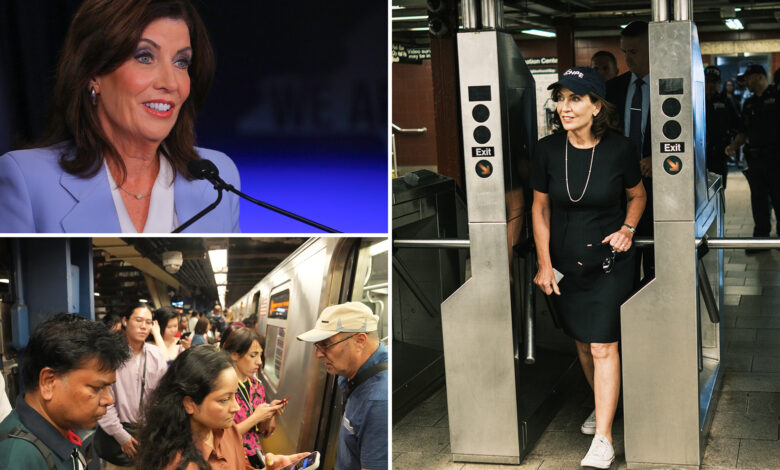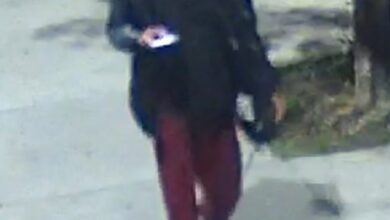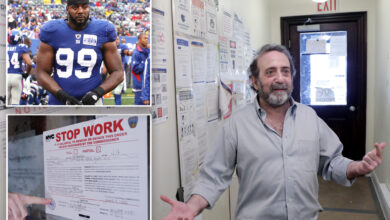Hochul restarts 2nd Ave. subway project and punts congestion pricing revenue fight to 2025

Gov. Kathy Hochul dug out $54 million to restart the Second Avenue Subway construction project stalled after her sudden pause of congestion pricing — but admitted Tuesday the issue of how to fill the $15 billion hole in the MTA’s budget will hold until next year.
The state legislature ended its session in June without a plan for replacing the billions of dollars in revenue that the Manhattan tolling scheme was anticipated to yield for the transit agency starting June 30 before Hochul slammed the brakes on it.
Asked by The Post about the plan, Hochul confirmed the issue was being punted to the 2025 state budget negotiations.
“The plan will be implemented in the budget the next year,” she said during a press conference in Albany Tuesday morning.
The exchange came moments after Hochul’s office announced work on expanding the Second Avenue Subway line in Harlem would continue using state funds.
Hochul dug the $54 million out of leftover infrastructure capital fund appropriated in 2016-2017.
“This shows Governor Hochul is committed to my constituents in East Harlem. She’s working to fix the transit desert,” Assemblyman Eddie Gibbs (D-Manhattan) told The Post. “I supported the congestion pricing and this shows the governor was right: we can keep projects moving while protecting middle-class New Yorkers who don’t want the congestion toll.”
Harlem Rep. Adriano Espaillat also expressed his gratitude, posting on X: “I am appreciative of [Gov. Kathy Hochul] for furthering her commitment to Second Avenue Subway by allocating $54 million in state funding to ensure this critical support for the project continues.”
“Governor Kathy Hochul just proved the sky isn’t falling by finding $54 million dollars to continue work on the Second Avenue Subway,” the anti-congestion pricing group Keep NYC Congestion Tax Free wrote in a statement.
Others seized on the announcement to point the finger back at Hochul’s “indefinite pause” of congestion pricing — and the $15 billion hole it blasted in the MTA’s 2020-2024 capital plan.
“Wow, fossil money, just like the fuel [Hochul] is fine with,” the pro-congestion pricing Riders Alliance posted to X.
“If we can do that just 277 more times we can fill the $15b hole in the capital budget,” Open New York, a pro-congestion pricing group, posted to X.
“I continue to believe this is an issue that can’t wait until next year’s session,” state Senate Transportation Committee Chairman Jeremy Cooney (D-Monroe) told The Post in a statement echoing an op-ed he penned for lohud.com just last week.
Fiscal wonks jeered at the idea of kicking the congestion pricing issue into next year, especially as Albany also has to figure out how to fund a significant portion of what the MTA is estimating could be a nearly $70 billion capital plan to be instituted over the next five years.
“The Governor may have bitten off far more than she can chew, because the MTA’s capital needs go way beyond $15 billion over the next five years,” ReInvent Albany Senior Policy Advisor Rachael Fauss wrote to The Post.
“In addition to addressing the fallout from the Governor stopping congestion pricing, the state budget negotiations will also involve the need to fully fund a 2025-29 MTA capital plan with a likely cost of around $70 billion.”
Citizens Budget Commission President Andrew Rein said: “It is huge part of the problem, but it’s only part of the problem,” pointing to next year’s capital plan discussions.
That roughly $70 billion price tag, spread over five years, will likely include a contribution from the federal government.
How much the feds contribute could vary greatly depending on whether Democrats have control of Congress and the White House, with the remainder left up to Albany.
Rein said the federal contribution is certainly a factor, but “we still have a huge problem” either way–one that will ultimately need a new or reworked revenue stream.
“They will need more resources, where they come from, it might be the $80 billion question.”




